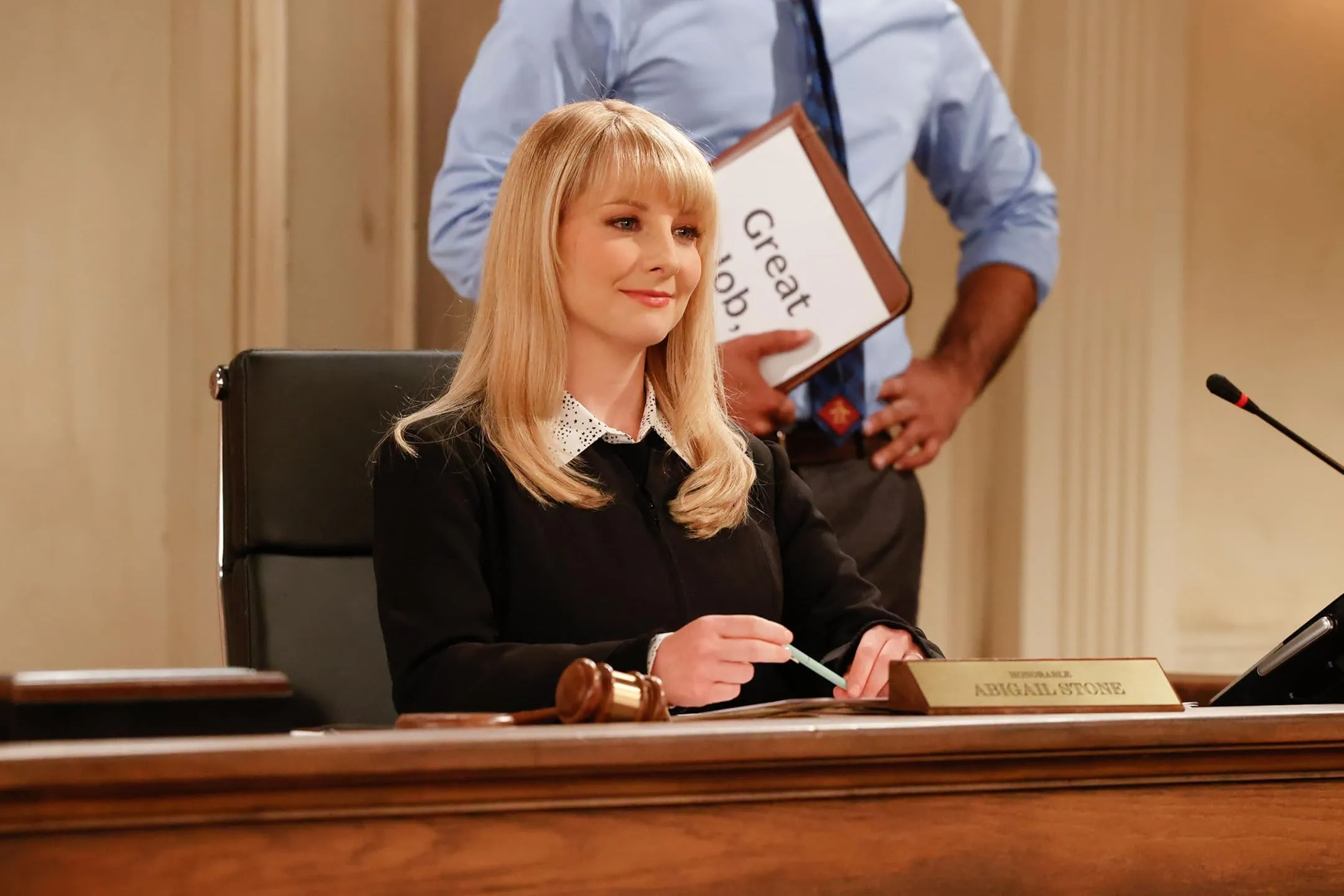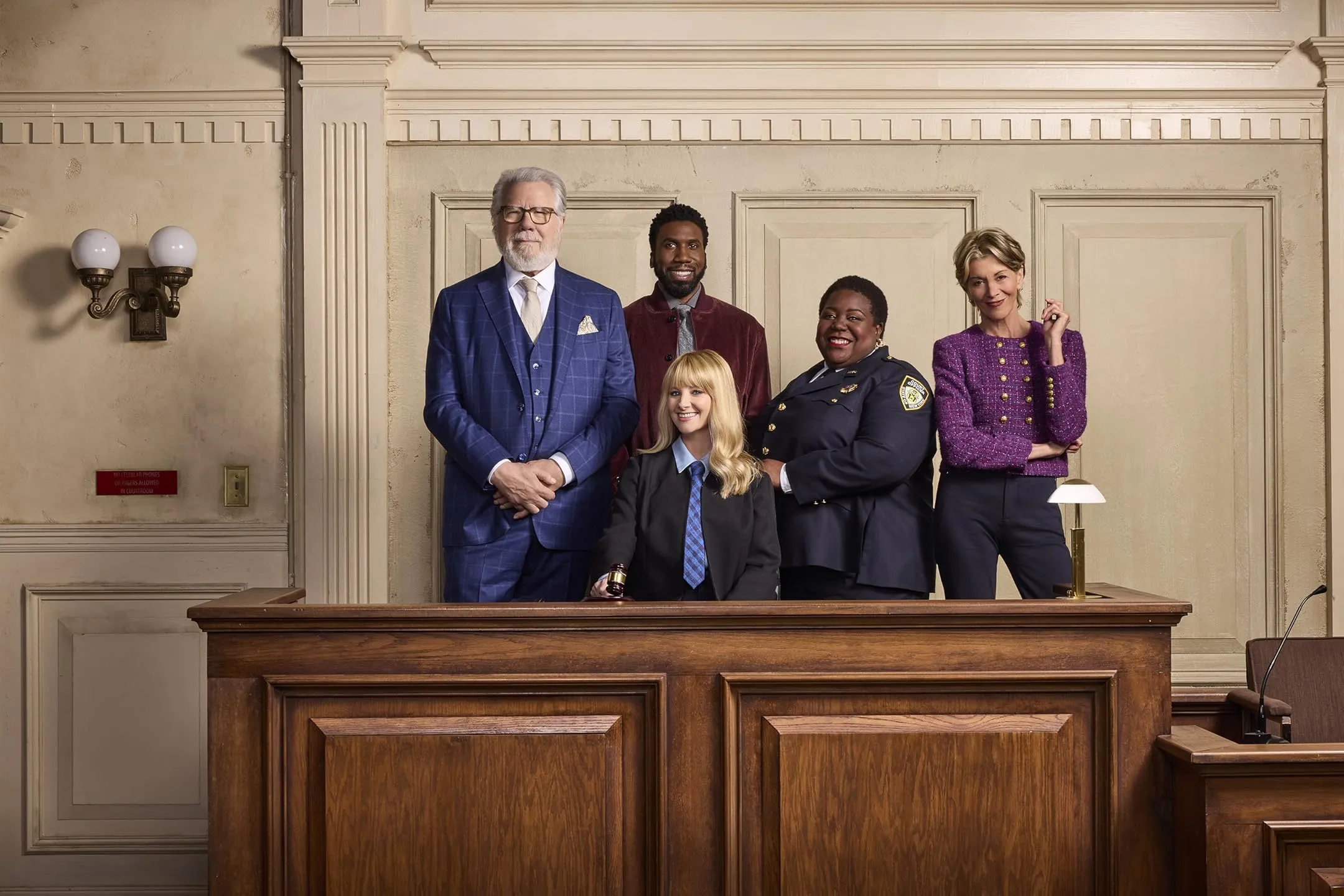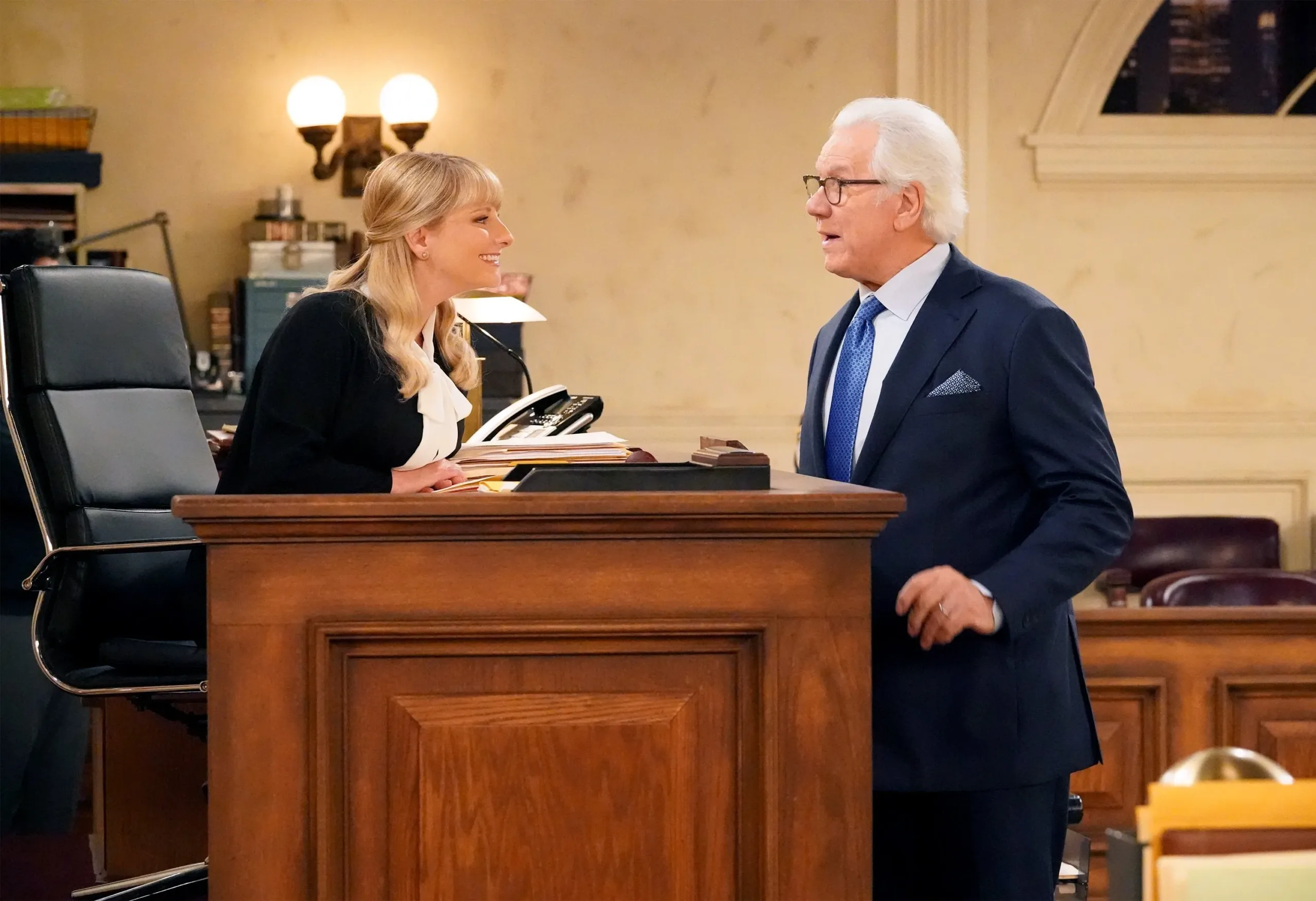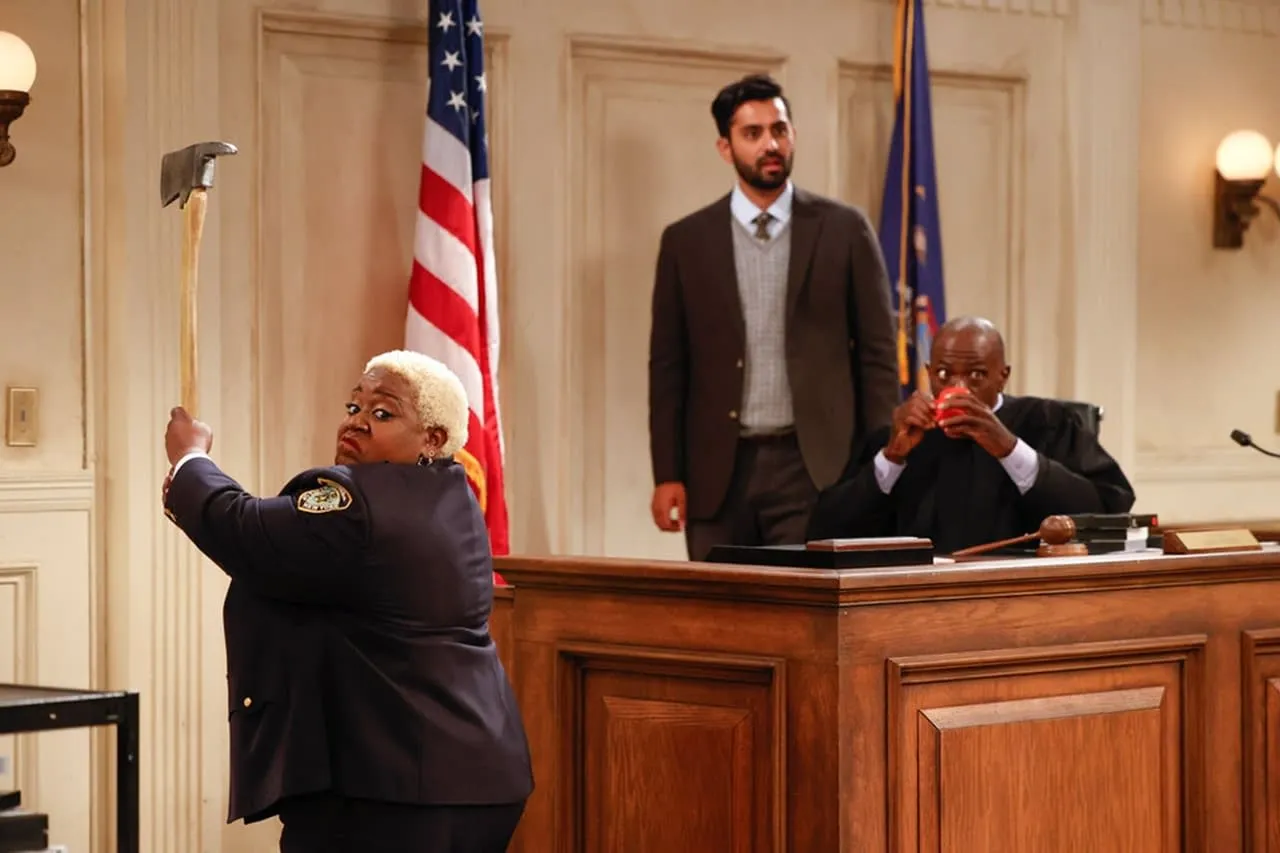The renowned courtroom comedy “Night Court” continues its astonishing revival, bringing new life to a classic series that initially captivated audiences’ hearts in the 1980s. This reimagined version takes off where the original left off, focusing on Judge Abby Stone (Melissa Rauch), the daughter of the great Harry Stone, and reintroducing fan favorite Dan Fielding (John Larroquette). Set in the same New York City courthouse that made the original series a comedy institution, the show expertly combines nostalgic references with contemporary storytelling.
The third season is a watershed point for the revival, including big cast changes and complicated character relationships that acknowledge the show’s past while forging its distinct identity. The addition of Wendie Malick and further character development reflect the series’ commitment to developing the courtroom comedy genre. More than just a reboot, this edition seeks to capture the essence of the original while communicating directly to contemporary viewers.
The show’s essence remains faithful to its origins: a quirky ensemble navigating the turmoil of late-night legal processes, finding humor in the most unexpected places while exploring deeper human relationships. The series’ third season aims to deliver the same heart and humor that made the original a television classic but updated for a new generation of viewers.
Courtroom Camaraderie: The Vibrant Ensemble of Night Court
At the heart of “Night Court” is a powerful ensemble that brings the bustling courthouse to life, creating a fresh and familiar comedic symphony. Melissa Rauch stars as Judge Abby Stone, a flurry of energy and optimism who honors her father’s heritage with a modern twist. She isn’t just filling her father’s shoes; she is creating her path, transforming the courtroom into a theater for subtle storytelling and unexpected humor.
John Larroquette returns as Dan Fielding, a character who has experienced a tremendous turnaround. He was once a flamboyant prosecutor, but he is now a thoughtful and reflective public defense with a razor-sharp wit that has not dimmed with age. Larroquette carries the show with a once nostalgic and completely fresh performance, giving a character that fans have adored for years more dimension.
Wendie Malick stars as Julianne Walters in the third season, a controversial addition that upends the courtroom dynamic. Despite a history of threatening Dan Fielding and a journey through therapy, Malick brings her customary snark and comedic timing to the character. Her character exemplifies the show’s ability to reinvent and surprise, bringing complexity to the ensemble.
The courtroom team is rounded out by supporting characters Flobert (Gary Anthony Williams), Wyatt (Nyambi Nyambi), and Gurgs (Lacretta). Each brings its own flavor to the mix; Lacretta’s Gurgs stands out for her ability to handle even the most ludicrous events with elegance and humor.
The show’s beauty lies in the interactions between its characters. The generational contrast between Abby’s unbounded optimism and Dan’s seasoned skepticism produces a lovely dynamic that keeps viewers interested. It’s a chemistry that goes beyond simple comedic rhythms to investigate deeper relationships and sociological complexities.
Wendie Malick’s arrival, in part, particularly amplifies the ensemble’s potential. Her ability to elicit laughter from seemingly commonplace phrases parallels Larroquette’s comedic prowess, implying a more balanced and dynamic comedic experience. The show attempts to shift from a star vehicle to a true ensemble comedy, similar to the original series’ strength.
Legal Laughs and Personal Puzzles: Navigating Night Court’s Third Season
Season 3 of “Night Court” delves into both personal mysteries and courtroom pandemonium, creating a narrative that is equal parts humorous and fascinating. The season’s most fascinating subplot concerns Judge Abby Stone’s wild speculation regarding her possible familial history.
When Jake’s mother, Susan, casually mentions sleeping with a tall prosecutor in the 1980s, Abby is thrown into a comedic inquiry that has her feverishly looking for DNA proof and terrified about unintentionally dating her prospective half-brother.
The case-of-the-week structure stays faithful to the show’s roots, presenting progressively odd legal circumstances highlighting the courthouse’s brand of controlled chaos. From colorful defendants to bizarre situations, each episode promises to deliver the kind of zany judicial proceedings that made the original series a cult favorite. Abby’s approach to these instances is similar to her father, Harry’s: a mixture of compassion, creativity, and a touch of lunacy.
This season’s focus is on character development. Dan Fielding’s shift from slick prosecutor to thoughtful public defense continues, giving a character noted for his comedic abilities new depth. Julianne Walters’ entrance adds another layer of complexity, with her history of threatening Dan creating a beautifully tense interaction with much comedic potential.
The show masterfully transcends generations, combining references to the original series with modern storytelling. “Night Court” manages to feel both nostalgic and totally current, whether it’s Dan’s continuous presence or Abby’s connection to her father’s legacy. Social themes are smoothly incorporated into the narrative, giving the comedy genuine heart and importance.
Subplots involving secondary characters, such as Gurgs’ mission to prevent Julianne from smoking on the fire escape, lend depth to the show’s world. These lesser storylines show the series’ commitment to creating an ensemble comedy that goes beyond simple courtroom antics.
Comedic Courtroom Chronicles: Wit, Wisdom, and Laughter
“Night Court” expertly balances slapstick comedy and deep social critique, creating a comedic experience that is both laugh-out-loud entertaining and surprisingly thoughtful. The show’s humor is more than just quick gags; it’s a nuanced dance of brilliant conversation, ridiculous situations, and character-driven comedy that feels familiar and fresh.
While firmly rooted in the present, the raw design draws direct inspiration from the original comedic series. Sharp one-liners bounce between characters, with John Larroquette’s Dan Fielding delivering razor-sharp jabs that haven’t lost their edge over time. Wendie Malick’s introduction boosts this comedic potential by introducing her usual sarcastic wit, which can transform even the most banal line into a comedy goldmine.
What distinguishes this iteration is its ability to smoothly integrate serious societal concerns and humor. Contemporary problems like social justice and personal identity are not forced lecture points but rather organic extensions of the characters’ lives. The comedy serves as a vehicle for more in-depth discussions, demonstrating that laughter can be both amusing and informative.
The show’s commitment to becoming a true ensemble comedy is evident in its approach to humor. Instead of depending exclusively on Larroquette’s comedic prowess, the writers have crafted opportunities for each ensemble member. This approach is shown by Lacretta’s Gurgs, who, with her persistent good mood and ability to handle ludicrous situations, is more than just a side character; she’s an important part of the show’s comedic machinery.
Situational comedy takes center stage, with courtroom cases as an ideal setting for increasingly ludicrous circumstances. Whether it’s Abby’s borderline-obsessive investigation into her probable familial links or the staff’s odd interpersonal relationships, each episode delivers unexpected laughs that feel spontaneous and meticulously crafted.
The humor straddles the line between nostalgic callback and current sensibility. It honors the original series’ tradition while refusing to be constrained, creating a comedic experience that speaks to various generations of viewers.
Crafting Comedic Justice: The Art of Reviving Night Court
Showrunner Dan Rubin emerges as the architectural mastermind behind the “Night Court” revival, tackling the series with surgical precision and comedic instinct. His goal extends beyond simple nostalgia, focused on creating a live, breathing ensemble that pays homage to the original while forging its path. Rubin’s technique meticulously readjusts the show’s chemistry, as the original series did in its early seasons.
The writing exhibits a tremendous commitment to character-driven storytelling. The dialogue is packed with wit, skillfully merging sharp one-liners with genuine emotional moments. With writings that allow nuanced performances beyond straightforward comedic setups, each character has space to breathe. The most memorable moments frequently emerge from unexpected interactions, such as Abby’s comic fixation with wit and comma placement during her possible family probe.
Pacing becomes a key strength of the show. Episodes are deliberately designed to accommodate multiple narratives without becoming crowded. The case-of-the-week framework gives a consistent structure, and continuous character arcs add complexity and coherence. Rubin and his writing team understand the delicate balance needed to keep viewers laughing and invested.
The show’s structural approach is based on the original’s successful model but incorporates modern narrative approaches. Each episode feels like a perfectly constructed comedy machine, with seemingly random events connecting to form a satisfying narrative whole. The writers keenly understand comedic timing and character development, ensuring that “Night Court” is both hilarious and touching.
Theatrical Courtroom: Visual Storytelling in Night Court
The “Night Court” production design functions as a visual time machine, seamlessly spanning the gap between nostalgic recollection and contemporary narration. The courtroom set is the show’s pulsating heart, a meticulously crafted space that feels familiar and new. Every visual element speaks to the careful mix of honoring the original series and forging its identity.
The set design preserves the original’s controlled chaos while including subtle modern elements. Lighting and camera angles work together to improve comedic timing, creating visual jokes complimenting the script’s vocal humor. The cinematography takes a dynamic approach, allowing the ensemble cast’s energy to flow freely around the space.
While the assessment does not go into detail on technical aspects, it is evident that production decisions prioritize character and comedic drive. The visual approach serves the show’s primary purpose of creating an immersive, laugh-filled setting where legal absurdity can flourish.
Sound design and background components gently underscore the show’s comedic pace. Each visual and auditory choice appears to be deliberately planned to complement the narrative’s comedic and emotional beats. The production team recognizes that in a comedy like “Night Court,” every design detail presents an opportunity for storytelling.
The result is a visually appealing world that feels timeless and contemporary, like a courtroom where humor has no bounds.
Justice Reimagined: Courtroom Chronicles of Modern Life
“Night Court” emerges as more than just a comedy; it’s a complex analysis of contemporary societal issues, brilliantly veiled as a courtroom comedy series. The show handles complicated societal themes with extraordinary agility, employing humor as a Trojan horse for deeper discussions about justice, identity, and human connection.
Dan Fielding and Abby Stone’s generational interaction provides a powerful lens to examine societal progress. Their exchanges show shifting attitudes toward law, morality, and personal development. Whereas the original series pushed limits in the 1980s, this revival upholds that heritage by addressing contemporary problems with wit and tenderness.
Themes of personal identity are prominent, particularly in plots such as Abby’s investigation into her possible family history. The show does not just make jokes; it also investigates how human narratives link with larger social situations. Every case presents an opportunity to study systemic challenges, ranging from legal injustices to personal transformation.
Nostalgia is not a crutch but rather a bridge between generations. The revival honors the spirit of the original series while remaining firmly rooted in the present. John Larroquette’s Dan Fielding perfectly personifies this: a character who has changed while remaining profoundly faithful to his original identity.
The series demonstrates how comedy can be an effective vehicle for social commentary. By combining humor with true human insight, “Night Court” offers a space where laughter and understanding coexist, challenging viewers to perceive the world through a more compassionate, nuanced lens.
The Review
Night Court Season 3
"Night Court" is a spectacular revival that defies the traditional relaunch expectations. The show demonstrates that sophisticated ensemble comedy can cross decades by honoring the original series' comedic tradition while forging its path. Melissa Rauch and John Larroquette lead an exceptional cast, transforming what could have been a purely nostalgic exercise into a dynamic, current series that speaks to modern audiences. The show's greatest strength is mixing razor-sharp humor with genuine heart. Each episode delivers laugh-out-loud moments while also delving into deeper social concerns. The ensemble cast, particularly Wendie Malick's addition, brings a dynamic energy to the courtroom proceedings, keeping them fresh and unpredictable. While not without occasional comedic errors, "Night Court" generally shows a true passion for its source material and a commitment to character-driven story development. It manages the tricky challenge of seeming familiar and entirely new, a rare feat in TV revivals.
PROS
- Strong ensemble cast with excellent chemistry
- Successful revival of the original series concept
- John Larroquette's continued brilliant performance
- Clever, witty dialogue that balances humor and depth
- Thoughtful integration of contemporary social issues
- Compelling character development
CONS
- Occasional uneven pacing
- Some storylines feel slightly predictable
- Potential over-reliance on callback humor



















































